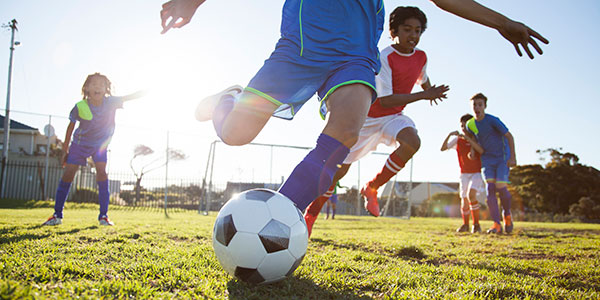Concussions
A concussion is also called a mild traumatic brain injury (mTBI). It means your brain has swelled because of a blow to the head or another part of your body. Concussions can be caused by car accidents, falls and sports injuries.

If you’ve been injured during a game or sport, it’s extremely important to watch for symptoms of a concussion. If you have any symptoms commonly associated with a concussion following a collision, IMMEDIATELY stop playing and seek medical care as soon as possible.
Symptoms include:
- Loss of consciousness for any time.
- Persistent headache.
- Nausea or vomiting.
- Cognitive impairment, including problems following instructions, difficulty responding to questions or generally feeling “foggy.”
- Eye problems, such as blurred vision or double vision.
- Drowsiness.
- Balance problems and clumsiness.
- Forgetfulness of events directly before or after the injury.
- Light or noise sensitivity.
- Seizures (indicates a need for immediate medical attention).
- Emotional changes, such as mood swings.
Preventing Concussion
Whether or not you’ve had a concussion before, the following tips can help you stay safe.
- Wear a helmet. While helmets can’t prevent a concussion, they can reduce the severity of a head injury. Always wear a helmet while riding a bike, skateboarding, playing contact sports like football or lacrosse and while riding a horse.
- Report any possible concussion to your parent, coach or healthcare provider.
- Never try to “just play through” a head injury.
- Follow the rules of play and exhibit good sportsmanship when participating in contact sports such as football or hockey.
- Speak up if something looks unsafe. Questioning a peer or authority figure can be intimidating, but speaking up can help you and your teammates prevent serious injury.
Recovery From Concussion
- Rest, rest, rest! Getting plenty of sleep will help you recover.
- Tell your doctor about any changes in symptoms or if new symptoms arise.
- Don’t exercise or play sports until cleared by your care provider.
- Let your teachers know what’s going on and ask for extensions as needed. You may need a note from your doctor to make this request.
- Be patient with yourself. Just as with any other injury, it’ll take time to fully recover and feel “normal” again.
- Learn more about the typical steps for returning to school and sports.
Last reviewed: August 2019




